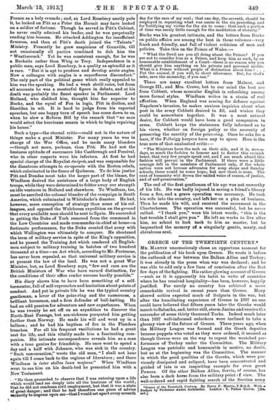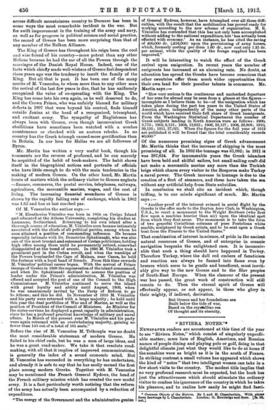GREECE OF THE TWENTIETH CENTURY.* MR. MARTIN unconsciously chose an
opportune moment for the publication of his book upon Greece. He wrote it before the outbreak of war between the Balkan Allies and Turkey; it was already in the press when war was declared ; and he was able to add only a few lines of conclusion after the first few days of the fighting. His rather glowing account. of Greece —such as it is apparently his habit to write of countries where he has received hospitality—has been, however, happily justified. For surely no country has achieved a more remarkable revival in recent years than Greece. Many shrewd critics expected much of Bulgaria in the war, but after the humiliating experience of Greece in 1897 no one could have believed that fifteen years later the Greeks would march to Salonika, and, better still, storm Janina and receive th?. surrender of some thirty thoUsand Turks. Indeed much later than 1897 well-informed onlookers were inclined to take a gloomy view of the future- of Greece. Three years ago, when the Military League was formed and the Greek deputies became puppets who voted as they were ordered, it Seethed as though Greece were on the way to repeat the wretched per- formance of Turkey under the Committee. The Military League was patriotic and honourable in' motive, no doubt, but so at the beginning was the Committee. The manner in which the good qualities of the Greeks, which were pre- viously dissipated and eclipsed, have been concentrated and guided of late is 'an inspiriting example for even great Powers. Of the other Balkan Allies, Servia, of course, has also been a dark horse from the military point cf view. . The well-ordered and rapid fighting march of the Servian army • ()TWO of the Twentieth Century. By Percy F. Martin, F.B.G.S. With a Preface by Professor Andre Andreades. London : T. Fisher Unnin. U.Sa,
net4
across difficult mountainous country to Durazzo has been in some ways the most remarkable incident in the war. But for swift improvement in the training of the army and navy, as well as for progress in political science and social practice, the record of Greece has been more surprising than that of any member of the Balkan Alliance.
The King of Greece has throughout his reign been the cool and wise friend of his country—more potent than any other HeIlene because he had the ear of all the Powers through the marriages of the Danish Royal House. Indeed, one of the facts which chiefly made well-wishers of Greece feel despondent three years ago was the tendency to insult the family of the King. But all that is past. It has been one of the many merits of M. Venezelos, to whom more than to any other man the revival of the last few years is due, that he has uniformly recognized the value of co-operating with the King. The King has come into his own again, as he well deserved to do, and the Crown Prince, whO was unfairly blamed for military defects in 1897 that were beyond his control, finds himself outside Janina at the head of a reorganized, triumphant, and exultant army. The sympathy of Englishmen has always been with Greece, even though inconvenient Greek ebullitions have sometimes been watched with a sombre countenance or checked with an austere rebuke. In no country has the Greek triumph caused more gratification than in Britain. In our love for Hellas we are all followers of Byron.
Mr. Martin has written a very useful book, though his comments are the reverse of profound, and he can scarcely be acquitted of the habit of book-makers. The habit shows itself in the biographical notices and portraits of officials who have little enough to do with the main tendencies in the making of modern Greece. On the other hand, Mr. Martin treats of matters which the ordinary visitor to Greece neglects —finance, commerce, the postal service, telephones, railways, agriculture, the mercantile marine, wages, and the cost of living. The increasing financial soundness of Greece is shown by the rapidly falling rate of exchange, which in 1902 was 1.62 and has at last reached par.
Of M. Venezelos the author says :— " M. Eleutherios Venizelos was born in 1854 on Cerigo Island and educated at the Athens University, completing his studies at Lausanne, Switzerland. Returning to his own island after a thorough course of education, M. Venizelos soon became intimately associated with the chiefs of all political parties, among whom he soon attained a position of commanding influence. He became especially intimate with Dr. Demetrius Sphakianaki, who was also one of the most trusted-and-esteemed-of Cretan politicians, holding high office among them until he permanently retired, somewhat disappointed at the trend of events. In 1896 M. Venizelos took a prominent part in the Cretan revolt, and when the warships of the Powers bombarded the Cape of Malaza, near Canoe, he held the fortress with a loyal band of friends. From this time onwards 31. Venizelos' political career began. With the arrival of Prince George of Greece in 1898 the regeneration of the island commenced, and when Dr. Sphakianaki declined to assume the position of leader under the Prince's administration, M. Wnizelos was offered and accepted the post of one of the Council to the High
Commissioner. M. Venizelos continued to serve the island with great loyalty and ability until August, 1909, when he was unanimously invited by the Party of Reform to go to Athens ; and this he did. In November of 1910 M. Venizelos and his party were returned with a large majority ; he held until
this year the dual portfolios of War and of Marine, as well as the position of President of the Council of Ministers. As Minister for the sister-services he displayed a great capacity in administration,
since he has a profound practical knowledge of military and naval affairs. In March of the present year M. Venizelos and his party were again returned with an overwhelming majority, gaining no fewer than 150 out of a total of 181 seats."
Before the rise of M. Venezelos M. Trikoupis was no doubt
the most considerable statesman of modern Greece. He failed in his chief ends, but he was a man of large ideas, and he was a great road-maker. We take it that resolute road- making, with all that it implies of improved communications, is generally the index of a sound economic mind. But M. Venezelos has succeeded in everything he has undertaken, and already it is safe to say that be has easily earned the first place among modern Greeks. Together with M. Venezelos may be mentioned the French General Eydoux, the head of the French military mission which has created the new model army. It is a fact particularly worth noticing that the reform of the army has actually been accompanied by a reduction of expenditure, "The energy of the Government and the administrative genius of General Eydoux, however, have triumphed over all these diffi- culties, with the result that the mobilization has proved ready for working according to the new scheme of organization. M. E. Venizelos has contended that this has not only been accomplished without adding to the national expenditure, but ' has actually been effected with economy.' As an instance, he has cited the saving of 400,000 dr. (.C16,000) upon the provisioning of army horses, which, formerly costing per diem 1.60 dr., now cost only 1.35 dr. per animal, while the quality of the forage supplied has been improved."
It will be interesting to watch the effect of the Greek revival upon emigration. In recent years the number of emigrants has increased at an alarming rate. No doubt, at education has spread the Greeks have become conscious that other countries offer them much wider opportunities than
their own land for their peculiar talents in commerce. Mr. Martin says "How very serious is the continuous and unchecked departure of her sons for abroad may be seen from a glance at the figures— incomplete as I believe them to be—of the emigration which has taken place during the past ten years to the United States of America alone, independently of the many other parts of the world which have received their full share of Greek immigrants. From the Washington Statistical Department the number of Greek subjects landing in North America were as follows : 1900 3,773 ; 1902, 8,115 ; 1904, 12,625 ; 1906, 23,127 ; 1908, 28,808 ; 1910, 39,135; 1911, 37,021. When the figures for the full year of 1912 are published it will be found that the total considerably exceeds 40,000."
Of the numerous promising signs of Greek advancement Mr. Martin thinks that the increase of shipping is the most promising of all. In 1892 the tonnage was 61,092; in 1911 it was 387,634. For innumerable years the Greek islander* have been bold and skilful sailors, but small sailing craft did not make a mercantile marine any more than the Turkish brigs which charm every visitor to the Bosporus make Turkey a naval power. The Greek increase in tonnage is due to the creation of a fleet of steamers, and these have taken the sea without any artificial help from State subsidies.
In conclusion we shall cite an incident which, though trifling, is to our minds significant of much. Mr. Martin says :—
" Another proof of the interest evinced in aerial flight by the Greeks is the offer made to the Dayton Aero Club, in Washington, U.S.A., to erect a monument to the Wright Brothers (who first flew upon a machine heavier than air) upon the identical spot from which they first arose. The monument is to take the form of two graceful Corinthian columns of pure Penteliean white marble, sculptured by Greek artists, and to be sent upon a Greek boat from the Piraeus to the United States."
That combination of interest in science, of pride in the ancient natural resources of Greece, and of enterprise in oceanic navigation bespeaks the enlightened race. It is inconceiv. able that such a thing should have happened in Turkey. Therefore Turkey, where the dull red embers of fanaticism and reaction can always be fanned into flame even by breezes which seem to be gentle and beneficent, must inevit- ably give way to the new Greece and to the Slav peoples of South-East Europe. When the clamour of the present
war has passed, the great work of construction will still remain to do. Then the eternal spirit of Greece will effectually appear, or not appear, in those who glory in their mighty, if indirect, derivation.
But Greece and her foundations are
Built below the tide of war, Based on the erysbkllina sea Of thought and its eternity.















































 Previous page
Previous page